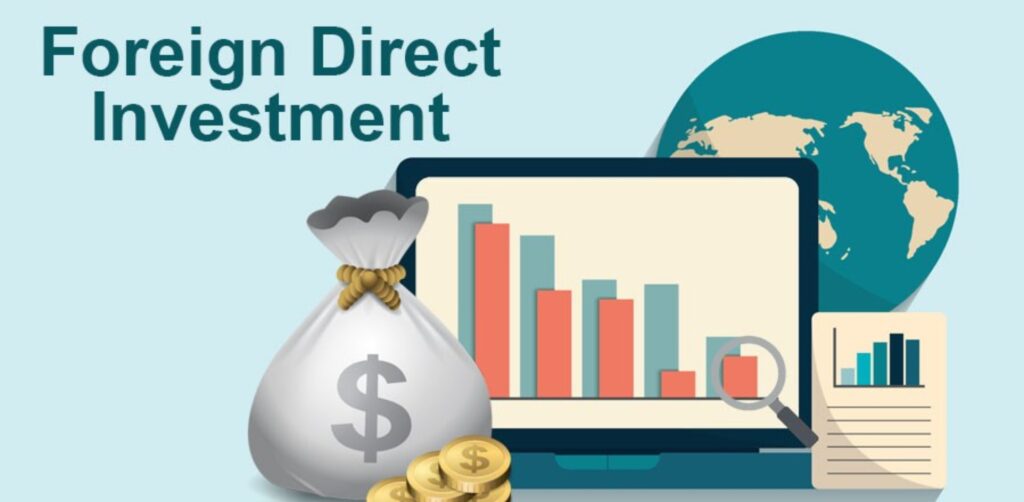The term foreign direct investment (FDI) refers to an ownership stake in a foreign company or project made by an investor, company, or government from another country. FDI is generally used to describe a business decision to acquire a substantial stake in a foreign business or to buy it outright to expand operations to a new region. The term is usually not used to describe a stock investment in a foreign company alone. FDI is a key element in international economic integration because it creates stable and long-lasting links between economies

Foreign Direct Investment or FDI
Foreign Portfolio Investments or FPIs, an investor in one country can hold a controlling stake of any business or organization in a foreign country that receives the investment. FDI is also a significant and insightful indicator of a certain country’s political and socio-economic stability.
This essentially implies a country that receives large amounts of investments from foreign entities on a regular basis is more likely to have a dynamic and vibrant economy.
How Does FDI Work?
Foreign investments can be either ‘organic’ or ‘inorganic’. With organic investments, a foreign investor will pump in funds to expand and accelerate growth in established businesses.
Inorganic investments are instances when an investing entity buys out a business in its target country.
In developing and emerging economies like India and other parts of South-East Asia, FDIs offer a much-needed fillip to businesses that may be in poor financial shape.
The Government of India has undertaken several measures to ensure that larger chunks of investments pour into the country across sectors including defence production, the telecom sector, PSU oil refineries and IT.
Since Foreign Direct Investment is a non-debt financial resource, it has the potential to become a major driver of economic development in India.
Globalization and internationalization are 2 factors which made FDI possible. However, the celebrated Canadian economist Stephen Hymer, considered the ‘Father of International Business’, theorized in the 1960s that foreign investments would continue growing rapidly because –
- It provided control over companies in a foreign land.
- It helped certain business sectors overthrow monopolistic practices, and
- Most importantly, since market imperfections will always exist, such investments provide companies with a cushioning effect if there was a sharp and unpredictable decline in business activity.
Types of FDI
The following are the main types of Foreign Direct Investment –
Type | Definition |
Horizontal | The first type is observed whenever a business expands and enters a foreign country via the FDI route without changing its core activities. An example would be McDonald’s investing in an Asian country to increase the number of stores in the region. |
Vertical | Here, a business enters a foreign economy to strengthen a part of its supply chain without changing its business in any way. If McDonald’s bought a large-scale meat processing plant in Canada or in a European country to bolster its meat supply chain in the target nation, it would amount to vertical FDI. |
Conglomerate | This 3rd type is noticed whenever a business invests in a foreign country and buys an entity which manufactures totally different products. The idea is to add more business niches and start new journeys in other countries. In the late 1980s, Sir Richard Branson’s Virgin Group launched clothing stores in France, called ‘Virgin Clothing’. The venture, however, failed miserably and very few outlets remain, mostly in the Middle-East. |
Platform | The last type refers to the expansion of a business to a foreign country, but everything manufactured there is exported to a third country. Platform FDI is seen in free-trade zones of FDI-hungry countries. Almost all luxury items marketed by famous fashion brands are manufactured in countries like Bangladesh, Vietnam and Thailand. They are then sold in other countries, a clear case of platform FDI at work. |
Pros and Cons of FDI
Advantages of Foreign Direct Investment –
- For businesses, more FDI means preferential tariffs, tax breaks or incentives, and an ability to diversify further.
- For a country that receives foreign funds, some benefits include greater employment opportunities, a stimulus to its domestic economy, and access to some of the latest technologies and modern management methods.
Disadvantages of Foreign Direct Investment-
- Local businesses lose out as big corporations take over markets. One example is Walmart, which was accused of ruining age-old smaller stores with its deep pockets.
However, Walmart’s foray was not successful; its entire portfolio is now owned by Flipkart. - There is always the risk of profit repatriation, which means that any profits generated in India will not enter the domestic economy.
FAQs
Why is foreign direct investment important?
Foreign direct investment promotes economic development. It is a country’s principal source of external money as well as higher revenues. It frequently results in the establishment of factories in the country of investment, with some local equipment – whether materials or labor – being used.
What are the benefits of foreign direct investment?
Foreign direct investment provides numerous benefits to the country. Some of them are discussed further down.
- Brings in financial resources to help with economic development.
- Introduces new technologies, skills, knowledge, and so on.
- Increases the number of job opportunities for people.
- Increases the country’s competitive business environment.
- Improves the quality of products and services in several industries.